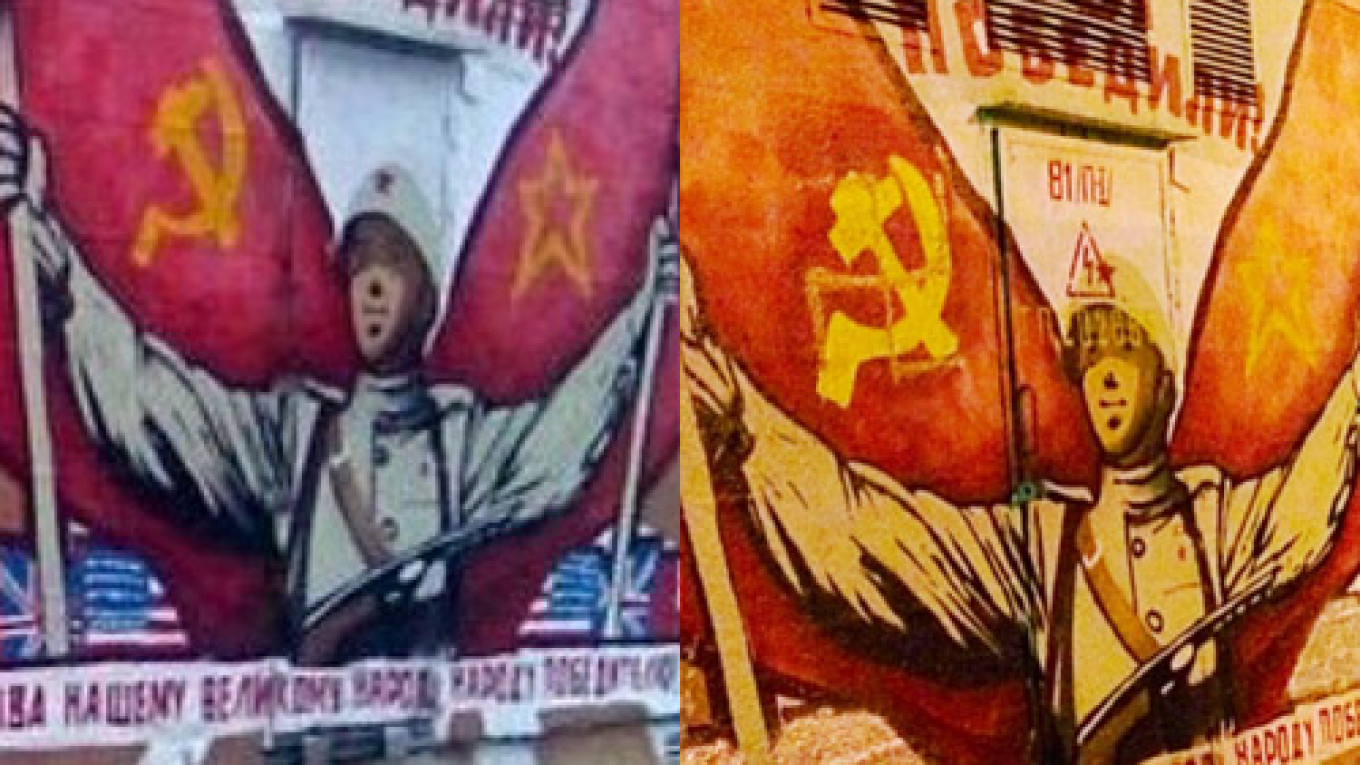Many foreigners visiting Moscow for the first time notice how gray and colorless it can be. However, a lot has changed since I first visited the city near the end of Boris Yeltsin's presidency in 1999. Newer, more modern buildings have sprung up. Older buildings have been renovated.
What's striking about Moscow are the contrasts created by the dizzying transition from socialist to capitalist economic system during perestroika. It was a difficult time for those living here. Some came out on top and flourished in the new system, but most didn't.
Several years ago in the Moscow neighborhood where I live, the small, drab municipal buildings and utility sheds were painted in an effort to make the area more lively.
Their sides are now covered by various images of beautiful landscapes, colorful fireworks and cartoon characters. The old structures have retained their functionality while gaining a certain aesthetic beauty.
One of the murals near my apartment depicts a large image of a Soviet soldier with the words "We Won!" to commemorate the end of World War II. At the bottom there were flags — British, Soviet and American.
I say "were" because upon returning to Moscow after the New Year's holiday, I was saddened to see that those flags had been erased. They are now covered by neat square patches of white indicating that it was no random act of graffiti, but the concerted effort of those who do not want such reminders of the past in the eyes of the public. I still pass by it every morning while taking my son to kindergarten.
There is a similar monument to the Allied forces here in Park Pobedy. Four large, bronze soldiers — French, British, Soviet and American — stand together, united by their victory. Is it only a matter of time before someone decides people no longer need to remember the times we worked together for the common good?
Recently I noticed several Russians around me on the metro reading about U.S. President Barack Obama's State of the Union address on their various devices. I believe Obama did Putin a huge favor by taking credit for, in his own words, "isolating Russia and leaving its economy in tatters."
Obama's announcement was essentially "We did this to you!" Does the U.S. government really expect the Russian people to thank them for the crashing currency rate and the dire situation many now find themselves in? I know firsthand how much harder life has become and how much more uncertain the future now looks.
It is much easier to destroy than to create. Just ask those who are struggling to create some kind of functioning government in Iraq, Libya and Ukraine, among other places.
It has been noted by some historians that the miraculous creation of the U.S. Constitution was, for the founding fathers, in many ways more difficult than defeating the British in our war for independence. Americans would do well to remember this.
There are deep-rooted problems that plague Russian society, such as corruption, lack of political reform and repression of free speech. These problems should be dealt with accordingly.
Sometimes a fresh coat of paint is preferable to tearing the building down. This is especially true when doing so ruins lives. No amount of paint, however, can help to improve our relations if that means whitewashing public memory.
Nathan Eyre is a Moscow-based teacher and translator.
A Message from The Moscow Times:
Dear readers,
We are facing unprecedented challenges. Russia's Prosecutor General's Office has designated The Moscow Times as an "undesirable" organization, criminalizing our work and putting our staff at risk of prosecution. This follows our earlier unjust labeling as a "foreign agent."
These actions are direct attempts to silence independent journalism in Russia. The authorities claim our work "discredits the decisions of the Russian leadership." We see things differently: we strive to provide accurate, unbiased reporting on Russia.
We, the journalists of The Moscow Times, refuse to be silenced. But to continue our work, we need your help.
Your support, no matter how small, makes a world of difference. If you can, please support us monthly starting from just $2. It's quick to set up, and every contribution makes a significant impact.
By supporting The Moscow Times, you're defending open, independent journalism in the face of repression. Thank you for standing with us.
Remind me later.






